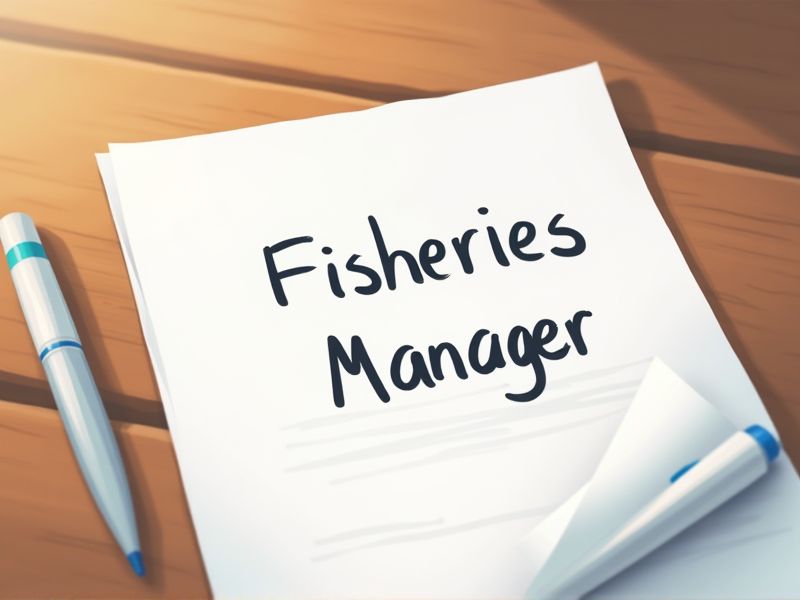
Fisheries managers play a crucial role in balancing ecological health, economic interests, and regulatory compliance in aquatic environments. Certifications ensure they possess specialized knowledge in areas such as sustainable practices, resource management, and environmental legislation. This structured expertise helps mitigate risks related to overfishing and habitat degradation. Key certifications for a fisheries manager may include those in aquatic resource management, environmental impact assessment, and marine policy analysis.
Certified Fisheries Professional (CFP)
The role of a Certified Fisheries Professional (CFP) ensures that fisheries managers have a rigorous understanding of aquatic ecosystems, which leads to more effective resource management and conservation strategies. This certification validates expertise in sustainable fishing practices, which reduces the adverse environmental impacts of overfishing. A CFP credential assures stakeholders of a manager's commitment to ethical and scientific standards, enhancing trust in fisheries management. As regulations and challenges in fisheries evolve, a CFP equips managers with updated knowledge and skills to adapt and address these issues efficiently.
Aquaculture Management Certification
Aquaculture Management Certification ensures fisheries managers can effectively oversee sustainable practices, reducing environmental impact and promoting ecosystem health. With the rise in demand for seafood, certified managers are better equipped to improve productivity while maintaining quality standards. Certification provides knowledge on disease management and efficient resource use, critical for economic viability. It fosters consumer confidence by guaranteeing adherence to industry regulations and sustainability criteria.
Sustainable Fisheries Management Certification
Sustainable fisheries management certification is essential because it provides a framework ensuring fish stocks remain at healthy levels, reducing overfishing. This certification incentivizes ecosystem preservation, maintaining the balance necessary for biodiversity. It enhances market access by appealing to environmentally-conscious consumers who prioritize certified products. Certification often results in improved legal compliance and operational efficiency, reducing environmental impact and ensuring long-term viability of fishing communities.
Marine Ecosystem Assessment Certification
Marine Ecosystem Assessment Certification ensures fisheries managers have a comprehensive understanding of marine biodiversity and ecosystem dynamics, allowing them to make informed decisions. Certification drives the implementation of sustainable practices, reducing overfishing and preserving fish stocks for future generations. It prioritizes ecosystem health, helping managers align operations with environmental regulations and mitigating negative impacts on marine habitats. It enhances the credibility and accountability of fisheries, fostering trust among stakeholders, including consumers and regulatory bodies.
Environmental Impact Assessment Certification
Environmental Impact Assessment (EIA) Certification equips fisheries managers with the necessary skills to identify and evaluate potential ecological impacts from fishery activities. This knowledge helps in developing sustainable practices that align with conservation goals and regulatory requirements. Certification ensures managers can effectively communicate with stakeholders about mitigation measures to preserve marine biodiversity. Access to broader professional networks is facilitated, enhancing collaborative efforts in sustainable fisheries management.
Coastal and Marine Spatial Planning Certification
Coastal and Marine Spatial Planning Certification equips fisheries managers with the skills to balance ecological health with commercial fishing interests, ensuring sustainable resource use. The knowledge gained from certification fosters better regulatory compliance, minimizing legal conflicts and inefficiencies. Acquiring such certification also enhances decision-making effectiveness, supporting adaptive management strategies in dynamic marine environments. Well-informed managers can navigate stakeholder interests more effectively, promoting collaborative and cohesive marine governance.
Wildlife and Habitat Conservation Certification
Fisheries managers need Wildlife and Habitat Conservation Certification to ensure sustainable fish populations through effective habitat restoration. This certification equips managers with the scientific knowledge to evaluate and mitigate environmental impacts on aquatic ecosystems. Understanding conservation principles enhances their ability to balance commercial fishing with ecosystem integrity. Certification instills credibility and accountability, fostering trust among stakeholders involved in fishery management.
Water Quality Management Certification
Water quality management certification equips fisheries managers with the necessary knowledge to assess and regulate water conditions, directly impacting fish health and ecosystem sustainability. Poor water quality often results in lower fish survival rates, which can affect fisheries' economic viability. Certification provides managers with the skills to implement effective strategies to mitigate pollution, ensuring a stable environment for fish populations. Understanding water quality parameters also fosters compliance with environmental regulations, reducing the risk of legal issues and associated costs.
Risk Management in Fisheries Certification
Risk management in fisheries certification is essential because it helps fisheries managers identify and mitigate potential sustainability issues, ensuring long-term viability of fish stocks. It enables managers to proactively address environmental and operational risks, reducing the likelihood of overfishing and habitat degradation. Certification processes also boost market access and consumer trust, as certified fisheries are perceived as more environmentally responsible. Implementing effective risk management enhances compliance with environmental regulations, safeguarding both the marine ecosystem and the economic interests of the fishing community.
Sustainable Seafood Certification
Sustainable seafood certification helps fisheries managers ensure the long-term viability of fish populations by promoting responsible fishing practices. It provides a market incentive to maintain ecological balance, reducing overfishing and habitat destruction. Certification encourages transparency and accountability, aiding managers in tracking and improving their operations. Access to certified markets often leads to better economic outcomes for fisheries, fostering community and stakeholder engagement.
Summary
When you earn certifications as a fisheries manager, your credibility in the field significantly increases, making stakeholders more likely to trust your expertise. It leads to improved management practices, as you can apply advanced techniques and methodologies learned during certification. This heightened competence typically results in sustainable fish stock levels, ensuring long-term ecological balance. Certified managers can also expect to enhance their career prospects and professional standing in the industry.
